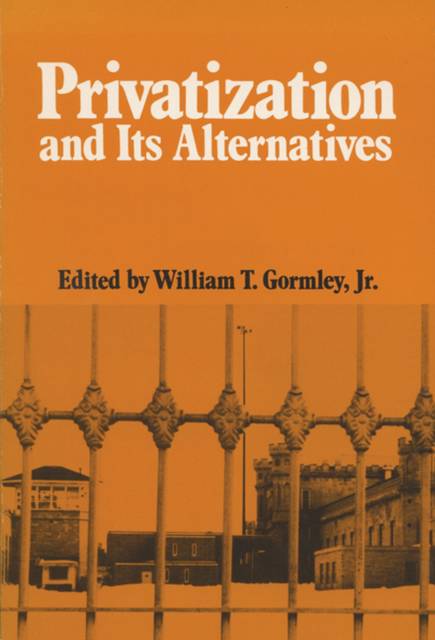
Je cadeautjes zeker op tijd in huis hebben voor de feestdagen? Kom langs in onze winkels en vind het perfecte geschenk!
- Afhalen na 1 uur in een winkel met voorraad
- Gratis thuislevering in België vanaf € 30
- Ruim aanbod met 7 miljoen producten
Je cadeautjes zeker op tijd in huis hebben voor de feestdagen? Kom langs in onze winkels en vind het perfecte geschenk!
- Afhalen na 1 uur in een winkel met voorraad
- Gratis thuislevering in België vanaf € 30
- Ruim aanbod met 7 miljoen producten
Zoeken
€ 31,45
+ 62 punten
Omschrijving
Privatization--the transfer of responsibility for public services from the public to the private sector--currently evokes intense interest from policy makers. To its advocates, privatization conjures up visions of a lean, streamlined public sector reliant upon the private marketplace for the delivery of public services. To opponents, it conjures up visions of a beleaguered government bureaucracy ceding vital public services to unreliable entrepreneurs. At best, privatization can reduce the costs of government and introduce new possibilities for the better delivery of services. At worst, it may undermine equity, quality, and accountability.
In Privatization and Its Alternatives distinguished scholars from several social science disciplines evaluate privatization efforts in the United States and abroad, and at different levels of government: federal, state, and local. They look primarily at three important policy areas--education, housing, and law enforcement--that sharply illustrate the dilemmas facing policy makers as the debate about privatization shifts from the delivery of "hard" services, such as refuse collection, to human services. Contributors have very different perspectives: some are enthusiastic about privatization, others are very skeptical indeed. None of these papers has been published elsewhere; the volume developed from a 1987 conference on privatization sponsored by the La Follette Institute of Public Affairs at the University of Wisconsin-Madison.
A particular strength of this collection lies in its consideration of alternative forms of service delivery. The privatization of public housing, for instance, may involve subsidies to the poor (vouchers), tenant management (a hybrid form of privatization), or outright sale. How, and how well, have such policies worked? Examples from other countries may prove especially enlightening: the English sale of public housing to tenants is one of the largest asset sales in the entire privatization movement; Australia has experimented with public subsidies to private schools; and Japan has experimented with the privatization of law enforcement and corrections. These issues are the subject of lively public debate in the United States today and are discussed at length in this volume. Thus Privatization and Its Alternatives speaks not only to scholars of public policy but also to a wide range of practitioner who must decide whether or how to privatize.
In Privatization and Its Alternatives distinguished scholars from several social science disciplines evaluate privatization efforts in the United States and abroad, and at different levels of government: federal, state, and local. They look primarily at three important policy areas--education, housing, and law enforcement--that sharply illustrate the dilemmas facing policy makers as the debate about privatization shifts from the delivery of "hard" services, such as refuse collection, to human services. Contributors have very different perspectives: some are enthusiastic about privatization, others are very skeptical indeed. None of these papers has been published elsewhere; the volume developed from a 1987 conference on privatization sponsored by the La Follette Institute of Public Affairs at the University of Wisconsin-Madison.
A particular strength of this collection lies in its consideration of alternative forms of service delivery. The privatization of public housing, for instance, may involve subsidies to the poor (vouchers), tenant management (a hybrid form of privatization), or outright sale. How, and how well, have such policies worked? Examples from other countries may prove especially enlightening: the English sale of public housing to tenants is one of the largest asset sales in the entire privatization movement; Australia has experimented with public subsidies to private schools; and Japan has experimented with the privatization of law enforcement and corrections. These issues are the subject of lively public debate in the United States today and are discussed at length in this volume. Thus Privatization and Its Alternatives speaks not only to scholars of public policy but also to a wide range of practitioner who must decide whether or how to privatize.
Specificaties
Betrokkenen
- Auteur(s):
- Vertaler(s):
- Uitgeverij:
Inhoud
- Aantal bladzijden:
- 320
- Taal:
- Engels
- Reeks:
Eigenschappen
- Productcode (EAN):
- 9780299117047
- Verschijningsdatum:
- 1/06/2004
- Uitvoering:
- Paperback
- Formaat:
- Trade paperback (VS)
- Afmetingen:
- 152 mm x 228 mm
- Gewicht:
- 467 g

Alleen bij Standaard Boekhandel
+ 62 punten op je klantenkaart van Standaard Boekhandel
Beoordelingen
We publiceren alleen reviews die voldoen aan de voorwaarden voor reviews. Bekijk onze voorwaarden voor reviews.









